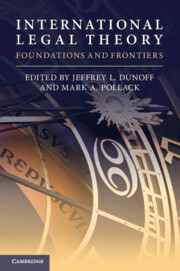Book contents
- International Legal Theory
- Reviews
- International Legal Theory
- Copyright page
- Contents
- Contributors
- Acknowledgments
- Part I Introduction: Setting the Stage
- Part II Traditional Approaches to International Law
- 2 Natural Law: Current Contributions of the Natural Law Tradition to International Law
- 3 International Legal Positivism
- 4 Legal Realism and International Law
- 5 Transnational Legal Process and the “New” New Haven School of International Law
- Part III Critical Approaches to International Law
- Part IV Post–Cold War Approaches to International Law
- Part V Interdisciplinary Approaches to International Law
- Part VI International Law: Dialogue and Dialectic
- Index
2 - Natural Law: Current Contributions of the Natural Law Tradition to International Law
from Part II - Traditional Approaches to International Law
Published online by Cambridge University Press: 21 July 2022
- International Legal Theory
- Reviews
- International Legal Theory
- Copyright page
- Contents
- Contributors
- Acknowledgments
- Part I Introduction: Setting the Stage
- Part II Traditional Approaches to International Law
- 2 Natural Law: Current Contributions of the Natural Law Tradition to International Law
- 3 International Legal Positivism
- 4 Legal Realism and International Law
- 5 Transnational Legal Process and the “New” New Haven School of International Law
- Part III Critical Approaches to International Law
- Part IV Post–Cold War Approaches to International Law
- Part V Interdisciplinary Approaches to International Law
- Part VI International Law: Dialogue and Dialectic
- Index
Summary
Many elements of current positive public international law (PIL) originated in theories of natural law, including both rules – of the law of the sea and of war, of refugee and asylum law – and constitutive conceptions of sovereignty. Several scholars argue that PIL has improved upon and replaced those origins, leaving the old natural law theories dead. PIL has come of age – indeed, laments about the need for natural law to fill its lacunae are replaced by frustrations about PIL’s ungoverned growth and fragmentation. Some say it is time for PIL to kick the ladder of natural law away.*
This chapter seeks to give voice to the other side. Proclamations of the death of natural law theories are premature. More plausible versions of natural law theory may still contribute as PIL continues to evolve, by treaty agreements and interpretations.
To be sure, many historical natural law theories are implausible by our standards.
- Type
- Chapter
- Information
- International Legal TheoryFoundations and Frontiers, pp. 39 - 62Publisher: Cambridge University PressPrint publication year: 2022

